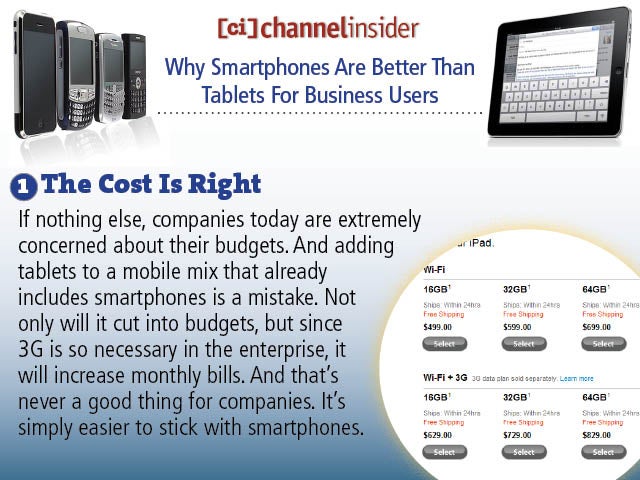 Why Smartphones Are Better Than Tablets For Business Users
Why Smartphones Are Better Than Tablets For Business Users
1. The Cost Is RightIf nothing else, companies today are extremely concerned about their budgets. And adding tablets to a mobile mix that already includes smartphones is a mistake. Not only will it cut into budgets, but since 3G is so necessary in the enterprise, it will increase monthly bills. And that’s never a good thing for companies. It’s simply easier to stick with smartphones.
 No Title
No Title
2. PortabilityThere’s little debating that tablets are more portable than notebooks. But when it comes to smartphones, they don’t even compare. Smartphones can be slipped into a pocket, and used as needed. Tablets still require a case of some sort to be toted around. If it’s portability a company is after, smartphones are the best option.
 No Title
No Title
3. The iPhone 4 Works Just FineMost companies are looking towards Apple’s iPad as the go-to device for their operations. But as companies truly evaluate their needs, they will quickly find that the iPhone 4 offers more opportunities. The device comes standard with 3G connectivity, more apps are designed for it, and it’s more readily affordable. If a company wants to deploy iOS, the iPhone 4 is the way to go.
 No Title
No Title
4. A BlackBerry Tablet Isn’t Available YetMany firms might view RIM’s PlayBook as a potential buy when it’s released early next year. But until that device launches, a BlackBerry smartphone is still the best bet for the average company. It comes with the right operating system, it boasts BlackBerry Enterprise Server, and it’s an all-around useful mobile OS. For now, it’s better than waiting for a BlackBerry tablet.
 No Title
No Title
5. Almost Guaranteed 3G ConnectivityThe main issue with Apple’s iPad, as well as some other tablets on the market, is that some of the device’s models don’t come with 3G standard. There are some models of the iPad with 3G, which should appeal to those who are looking for that, but the cheapest options don’t have 3G. Just about every smartphone today has 3G connectivity built-in, so it’s not even a concern for companies.
 No Title
No Title
6. It’s What Employees KnowWhen it’s all said and done, companies want to know that their employees are using the products that they feel most comfortable with. And although some tablets are easy to use, there are still far too many people that have never used a slate. And for those folks, a smartphone is a much better option. The enterprise should stick with what employees know — and that’s a smartphone.
 No Title
No Title
7. Tablets Aren’t A NecessityIn the corporate world, there isn’t a real and obvious need for tablets. After all, if a company already has notebooks or netbooks in its operation, it has that covered. However, smartphones are undoubtedly necessary, and they can mean the difference between success and failure in the business world. It’s important that companies keep that in mind.
 No Title
No Title
8. Video Chat Isn’t There YetGoing forward, video could play a more significant role in the enterprise, and a key component in that will revolve around video conferencing. With the iPhone that’s possible, albeit with some limitations. It’s also very possible with notebooks. But in the tablet space, it’s not done so easily. And until it is, smartphones are the best option.
 No Title
No Title
9. Android 2.2 Isn’t Ready for TabletsGoogle’s Android platform is fine for smartphones, but in the tablet space, it has a long way to go. Realizing that, maybe it’s time that companies that want to deploy Android in their operations stick with smartphones. Google itself said that Android 2.2 isn’t ready for tablets. The enterprise should take that for what it’s worth and stick with Android-based smartphones.
 No Title
No Title
10. Productivity ConcernsProductivity is extremely important in the corporate world. And for most companies, increasing productivity isn’t accomplished so easily. Although smartphones and tablets both contribute and detract from productivity, it’s clear now that tablets are more of a drain on employees. The reason for that is actually quite simple: tablets are focused more on entertainment than smartphones. And most users take advantage of that. If a company is worried about productivity, a tablet isn’t the best bet.

